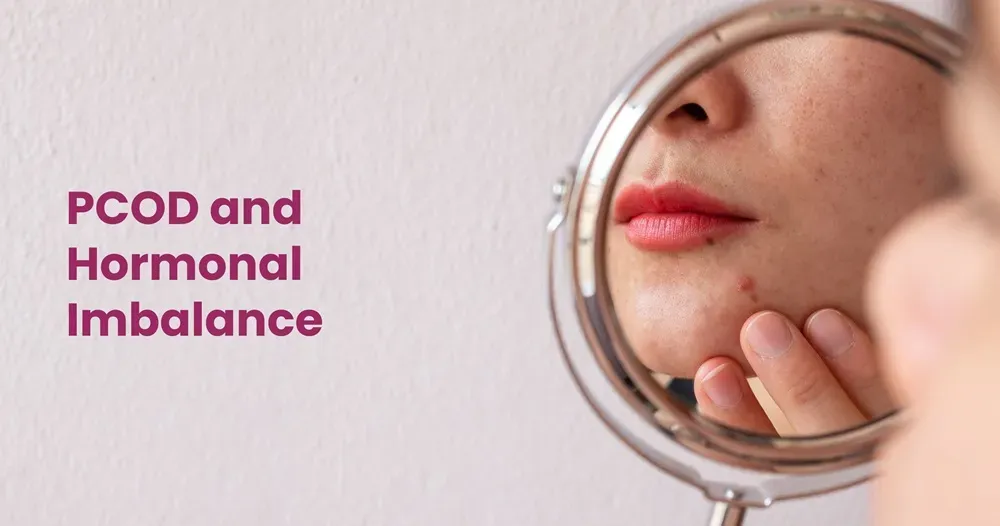PCOD and Hormonal Imbalance: Understanding the Complexities
Apr 22, 2024

Polycystic Ovary Disorder (PCOD) is an intricate and common hormonal disorder that affects millions of women worldwide. PCOD and hormonal imbalance result in various other symptoms, which may severely affect a woman's health and quality of life. This condition begins to appear in adolescence and affects fertile women. PCOD affects between 2.2% and 26.7% of women in this age range. Despite being common, PCOD is frequently misdiagnosed and misunderstood.
We will examine several aspects of PCOD in this extensive guide, including its complexities, symptoms, certain lifestyle modifications, and their relationship with hormonal imbalances.
Complexities of Hormonal Imbalances In PCOD
Polycystic ovary disorder, commonly known as PCOD, represents a complicated endocrine condition in women of reproductive age. Hormonal imbalance in PCOD is the main feature of this endocrine disorder. This results in various problems for the reproductive system, metabolism, and general health. Let us consider estrogen, progesterone, and androgen involvement in PCOD and also how these hormones facilitate the onset and eventual development of the illness.
- Estrogen Imbalance:
Estrogen controls the menstrual cycle and preserves reproductive health. Multiple factors cause elevated estrogen levels in PCOD. One main cause is the excessive production of estrogen hormone by the ovaries.
- Progesterone Deficiency:
Progesterone, also known as the pregnancy hormone, prepares the uterus for implantation and sustains pregnancy. PCOD commonly appears due to a combination of progesterone deficiency and undeveloped follicles, which leads to irregular or lack of ovulation.
Consequently, a hormonal imbalance develops, in which there is a lack of progesterone during the last stage of the menstrual cycle, the period known as the luteal phase defect.
- Role of Androgens:
A class of hormones known as androgens, which includes testosterone, is normally found in both males and females. However, women with PCOD frequently have higher testosterone and androgen levels.
Elevated androgens partly cause the symptoms of PCOS hormonal imbalance in females, which also upsets the body's delicate hormonal balance. Ovarian cysts and irregular menstruation may arise as a result of follicular development being disrupted by excess androgens.
What are the Causes of PCOD?
PCOD is thought to be caused by a combination of environmental and genetic factors, though its exact cause is still unknown. Among the key causes of PCOD are:
- Insulin Resistance: High insulin levels are a result of insulin resistance, which is common in PCOD-affected women. This may cause the ovaries to overproduce androgens or male hormones.
- Hormonal Imbalances: One of the main causes of PCOD is an imbalance in sex hormones, which includes decreased levels of follicle-stimulating hormone (FSH) and increased levels of androgens (like testosterone) and luteinizing hormone (LH). Period irregularities may result from these imbalances, which interfere with the
 regular menstrual cycle.
regular menstrual cycle. - Genetics: PCOD frequently runs in families, so there is the suggestion that it may have a genetic component.
What are the Symptoms of PCOD?
PCOD can cause a variety of symptoms, and not all women with PCOD will have the same ones. Typical signs and symptoms of PCOD consist of:
- Irregular Periods: The menstruation cycle is obstructed by non-ovulation. Some PCOD-affected women experience less than nine periods in a year or none at all.
- Heavy Bleeding: If you do experience periods, they may be heavier than usual because the uterine lining thickens over time.
- Hair Growth: Over 70% of females suffering from this ailment experience facial and body hair growth in areas such as the back, abdomen, and chest. This excessive hair growth is called hirsutism.
- Acne: Male hormones can cause oilier-than-normal skin and breakouts on the face, chest, and upper back.
- Weight Gain: 40-80% or more of women with PCOD are obese or overweight.
- Polycystic Ovaries: Women with PCOD frequently have enlarged ovaries on ultrasounds, which are filled with small sacs known as follicles.
What are the risk factors of PCOS?
Individuals with the following conditions are at a higher risk of developing PCOS:
- A family history of menstrual disorders (including PCOS)
- Type 2 diabetes
- Being overweight or obese
- Fast weight gain
PCOS is also more common in transgender men, sometimes referred to as female-to-male transsexuals or FTMs.
When to See a Doctor?
A yearly visit to your primary care physician should be sufficient if you are in good health and do not suffer from any chronic illnesses like diabetes. However, because PCOS can lead to difficulties, it's essential to get an annual medical examination with your PCP.
- Your annual appointment should include testing for blood pressure, cholesterol, and blood sugar. If any of these are abnormal, you might need to do more tests or schedule more regular visits.
- After PCOS is diagnosed, your doctor may also consider doing tests for fatty liver, depression, and obstructive sleep apnea.
Final Thoughts
Polycystic ovary disorder is a complicated hormonal disorder that affects women in various ways. Although PCOD and hormonal imbalance cannot be cured, its symptoms and related health risks can be effectively managed with medication, lifestyle changes, and, in certain situations, surgical procedures. Women with PCOD can have healthy, happy lives with the support of a comprehensive treatment plan and an early diagnosis.
If you suspect PCOD or are experiencing symptoms, contact Apollo Diagnostics for a proper evaluation and customized treatment plan. Our labs are equipped with fully automated equipment and the EQUAS (External Quality Assurance System) to guarantee error-free reports at a reasonable cost and with a short turnaround time.
FAQs
- How does PCOD affect pregnancy?
PCOD disrupts the regular menstrual cycle and increases the difficulty of becoming pregnant. Pregnancy complications may also be more likely in this case. Women with PCOD experience premature birth twice as frequently as women without PCOD. They also have an increased risk of miscarriage, hypertension, and gestational diabetes.
- How to Diagnose PCOD?
Women with at least two of these symptoms are usually diagnosed with PCOS by doctors:
- Elevated levels of testosterone
- Irregular cycles of menstruation
- Cysts in the ovaries
Additionally, your doctor should inquire about any symptoms you may have experienced, such as weight gain, acne, or facial and body hair growth. During a pelvic exam, your ovaries and other reproductive tract organs may be examined to check for issues.
- How does PCOD affect the body?
Your fertility and other aspects of your health may be impacted by having higher-than-normal levels of testosterone. PCOD affects in the following ways:
- Infertility
- Metabolic syndrome
- Sleep apnea
- Endometrial cancer
- Depression
Related Blog Post
Blog Categories
- Child Health
- Mens Health
- Women's Health
- Mental Health
- Health Myths & Facts
- Fitness
- Nutrition/Recipes
- Remedies
- Weight Management
- Stress Management
- Health Supplements
- Addiction Management
- Disease Management
- Allergy
- Anemia
- Arthritis
- Asthma
- Autoimmune Diseases
- Blood Pressure
- Cancer
- Deficiencies
- Dengue/Malaria/Chikungunya
- Diabetes
- Eye Problems
- Heart Diseases
- Hepatitis
- HIV/AIDS/STD
- Hormonal Imbalance
- Infection/Flu/Viral
- Kidney
- Liver
- Menstrual Problems
- Pregnancy
- Skin & Hair Problems
- Stomach Ailments
- Thyroid
- Others
- Health Checkups
- Diagnostics/Pathology
- Lifestyle & Wellness
- Covid
- Medical Tests
- Cholesterol
- Health Tips
- Parent Care/Old Age
- Lungs
- Food Intolerance








